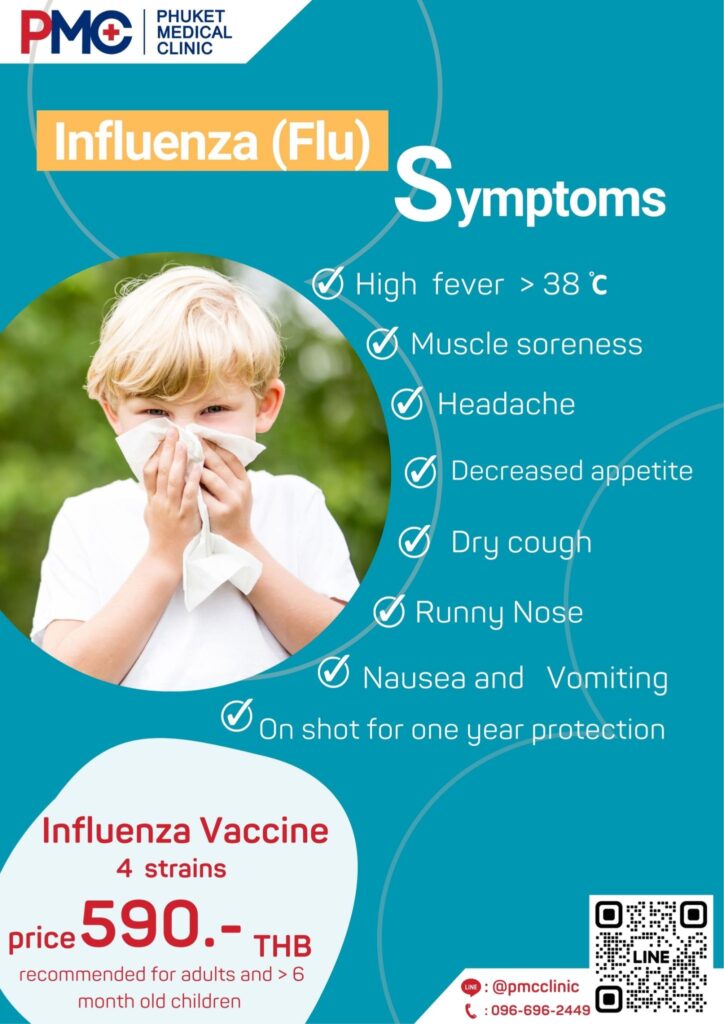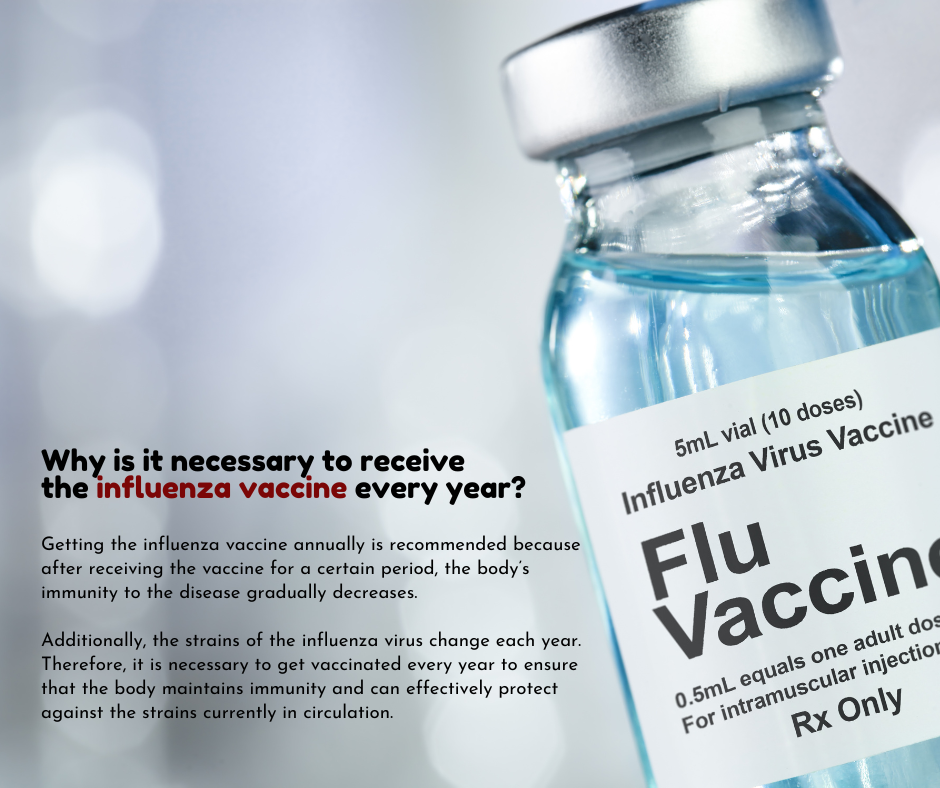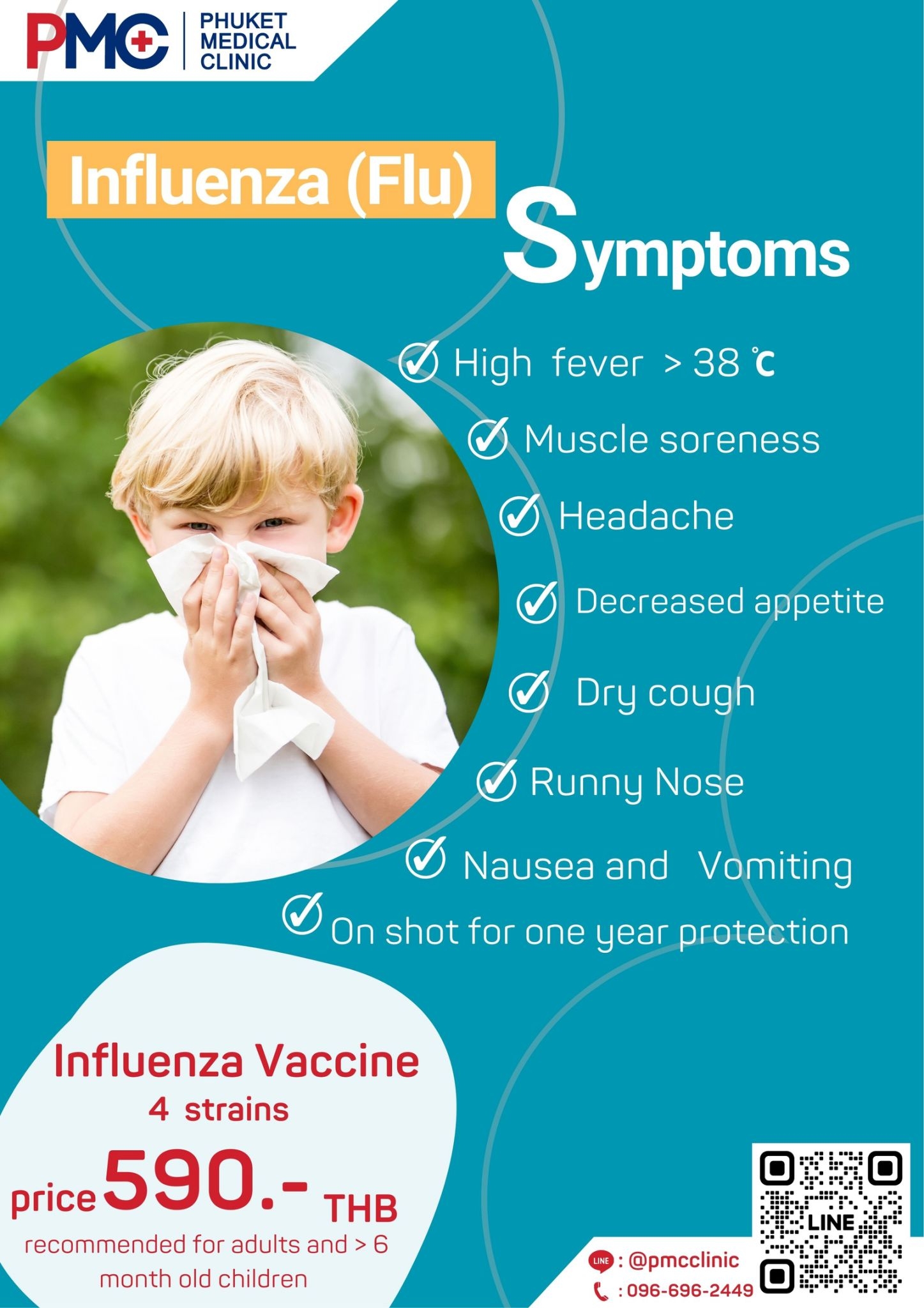Influenza, commonly known as the flu, is caused by the influenza virus. This virus is present in the mucus, saliva, or respiratory secretions of infected individuals and is transmitted through coughing, sneezing, or breathing the same air. Once the virus infects the upper respiratory tract, it leads to symptoms such as high fever, cough, sore throat, runny nose, nasal congestion, sneezing, headache, body aches, and fatigue, similar to a common cold.
However, the symptoms can be more severe in young children under the age of 2, the elderly, and individuals with underlying chronic conditions. Complications such as pneumonia and encephalitis can arise, and the virus can exacerbate pre-existing conditions like heart disease, diabetes, liver and kidney problems, potentially requiring hospitalization. Even after recovery, the body may experience lingering fatigue for several weeks.
Therefore, preventing influenza by getting vaccinated is crucial. Vaccination plays a significant role in minimizing the risk of contracting the flu.

Influenza can be divided into 4 strains as follows:
- The Influenza virus strain A/H1N1, commonly known as the Novel Influenza A (H1N1) or the 2009 H1N1 pandemic flu, is a contagious disease that originated in Mexico and quickly spread to various countries. This disease resulted from the reassortment of both human and animal strains of the virus, leading to a new strain that rapidly spread from person to person. Symptoms indicating this illness include high fever, runny nose, cough, and abnormal respiratory symptoms. Some individuals might also experience accompanying gastrointestinal symptoms. This disease can be treated with the antiviral medication called “Oseltamivir.”
- The Influenza virus strain A/H3N2 can be transmitted from pigs to humans and has caused severe outbreaks, particularly in Hong Kong. This strain is also referred to as the Hong Kong flu. Symptoms resembling typical flu symptoms occur, but additional symptoms may include muscle aches, rapid breathing, fatigue, and wheezing.
- The Influenza virus strain B Colorado lineage Victoria typically spreads in cold and dry weather or during the winter season. It primarily spreads from person to person. Individuals with underlying health conditions are at a higher risk of contracting this strain.
- The Influenza virus strain B Phuket lineage Yamagata is prevalent from December to January. The groups most susceptible to this strain are children under 2 years old, pregnant women, and the elderly.
The vaccine for preventing influenza, also known as the flu, is what?
The Influenza Vaccine is a type of injectable vaccine produced from inactivated virus. It undergoes a manufacturing process that ensures safety and high efficacy. While it helps prevent influenza, individuals who have received the vaccine might still experience the flu, but the symptoms tend to be milder. The influenza vaccine does not provide protection against common colds caused by other viruses.
The influenza vaccine used in Thailand is an inactivated vaccine, which comes in two groups:
- The group that consists of the major strains of the Influenza virus for the trivalent inactivated influenza vaccine are Influenza A, Influenza B, and Influenza C. However, in vigilant monitoring, only types A and B are considered seriously due to the fact that type C is less common, causes milder symptoms, and does not lead to widespread outbreaks to the extent of the first two types.
- The group that includes the major strains of the Influenza virus for the quadrivalent inactivated influenza vaccine covers four main strains of the virus, as follows:
- Influenza virus strain A/H1N1
- Influenza virus strain A/H3N2
- Influenza virus strain B lineage Victoria
- Influenza virus strain B lineage Yamagata
The World Health Organization recommends receiving the quadrivalent influenza vaccine as it is effective in providing increased coverage against influenza compared to before.
Why is it necessary to receive the influenza vaccine every year?
Getting the influenza vaccine annually is recommended because after receiving the vaccine for a certain period, the body’s immunity to the disease gradually decreases. Additionally, the strains of the influenza virus change each year. Therefore, it is necessary to get vaccinated every year to ensure that the body maintains immunity and can effectively protect against the strains currently in circulation.
- It is recommended to receive the influenza vaccine before the peak seasons of outbreaks (rainy and cold seasons). Therefore, it’s advisable to get vaccinated about 2 months in advance. This timing allows the vaccine to build a highly effective immunity in the body, which coincides with the period of potential outbreaks. Consistently getting vaccinated every year during this time is particularly crucial, especially for individuals in high-risk groups. This is because the body’s immune response to the influenza virus can decrease relatively quickly.
- Getting vaccinated every year is a way to stimulate the immune system to remain at a high level. This enables the body to maintain immunity against new strains of the influenza virus that emerge each year.
- The quadrivalent vaccine is recommended for individuals ranging from 6 months of age to adults, including the elderly, pregnant women, and breastfeeding mothers. They are all eligible to receive the influenza vaccine.

Who are the individuals recommended to receive the influenza vaccine?
- General individuals of all ages can receive the vaccine.
- Patients with chronic diseases including diabetes, cerebrovascular disease, kidney disease, asthma, chronic obstructive pulmonary disease (COPD), chronic lung disease, heart disease, liver disease, blood disorders, and those undergoing chemotherapy for cancer.
- Pregnant women at or after the 4th month of pregnancy.
- Individuals aged 65 and above.
- Children aged 6 months to 2 years.
- Individuals with severe brain injury who cannot care for themselves.
- Thalassemia patients.
- Individuals with weakened immune systems and those with symptomatic HIV infection.
- Individuals with a weight of 100 kilograms or a BMI of 35 Kg/m2.
- Individuals planning to travel abroad, especially to Europe and the Americas.
- Individuals likely to be in crowded or densely populated areas, such as those attending religious ceremonies, sports events, or various festivals.
- Medical personnel and staff involved in patient care.
Who are the individuals who should not receive the influenza vaccine?
- Children under 6 months of age.
- Individuals with muscle weakness disorders.
- Individuals who previously received the influenza vaccine and experienced severe allergic reactions to the vaccine components in a previous dose.
- Individuals with a history of severe egg allergy or allergies to various vaccine components (the influenza vaccine does not contain antibiotics and preservatives).
- If you have a sudden fever, illness, or uncontrolled chronic conditions, it’s advisable to postpone the vaccination. In the case of a minor cold without fever, the vaccine can still be administered.
Side effects of the influenza vaccine.
- Specific symptoms at the injection site, such as pain, swelling, and redness, may occur within 24-48 hours after vaccination. However, these symptoms usually resolve on their own within 2-7 days. Cold compresses can also be applied to the injection site. If any abnormal symptoms occur beyond this, it’s advisable to consult a doctor.
- After vaccination, some individuals might experience mild fever, discomfort, muscle aches, and headache. These symptoms might start within 6-12 hours and can last 1-2 days without requiring treatment.
- Severe allergic reactions are extremely rare and would typically manifest within 2-3 minutes to 2-3 hours after vaccination. Symptoms might include difficulty breathing, wheezing, hoarseness, hives, weakness, rapid heartbeat, or dizziness. If any of these symptoms occur, immediate medical attention is necessary.
What are the benefits of the quadrivalent influenza vaccine?
In addition to providing protection against the four mentioned strains of the influenza virus, the influenza vaccine offers additional benefits, including:
- The influenza vaccine can provide increased coverage against the Type B strain of the influenza virus, as the flu virus undergoes strain changes every year.
- It stimulates and strengthens the immune system.
- It reduces the rate of influenza outbreaks.
- It decreases middle ear infections in children.
- It lowers the risk of complications resulting from influenza infections, especially in young children and chronic patients.
- It reduces the need for antibiotics for secondary bacterial infections associated with influenza.
- It cuts down on healthcare expenses for treatment.
- It minimizes work or school absenteeism.
- It decreases hospitalization costs.
- It reduces the mortality rate due to influenza.
- It protects patients with chronic conditions from infection risks.
- It offers influenza protection for individuals aged 65 and above, with an effectiveness rate of 60%.
Where can you receive the influenza vaccine in Phuket?
Phuket Medical Clinic : Close, Expert Care. Dedicated Medical Professionals and Skilled Team providing Consultation and Treatment. Walk-in or Scheduled Appointments for Convenient and Efficient Services.
Book an appointment online : https://phuketmedicalclinic.youcanbook.me
Daily Open 🕙 10:00-18:00
Contact number ☎️ 096-696-2449
Line id : @pmcphuket or https://lin.ee/R1TKRDo
Map 📌https://goo.gl/maps/xu45eTQUTjgpukJa7
Website 🌐https://phuketmedicalclinic.com
Feel free to consult with a doctor or ask further questions anytime.
Inbox : m.me/100483916443107
#healthcareclinic #คลินิกภูเก็ต
Phuket #Clinic #ภูเก็ตเมดิคอลคลินิก
#Phuketmedicalclinic

